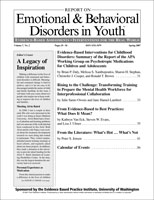Complete Issue
Author: Joni Splett.; Melissa George.
Source: Volume 14, Number 03, Summer 2014 , pp.51-74(24)

< previous article |return to table of contents
Abstract:
This special issue of the Report on Emotional & Behavioral Disorders in Youth includes articles that highlight key steps across the process of planning, implementing, and evaluating evidence-based practices in school mental health. The need for evidence-based practices in the delivery of school mental health services is compelling. Although almost one in five students presents noteworthy emotional/behavioral challenges that can affect quality of life, school achievement, and long-term outcomes, fewer than half of these students receive any mental health services (Perou et al., 2013). Of those students who do receive services, most are served in schools (Burns et al., 1995). Not only do schools improve access to mental health care, but school professionals are increasingly recognizing and addressing students’ mental health needs because they create barriers to learning and academic success (Adelman & Taylor, 1999). As a result, momentum has accelerated in both the education and mental health fields to improve the capacity of schools to support students through prevention, early intervention, and treatment with mental health problems. Capacity-building efforts must include attention to the process of planning, implementing, and evaluating evidence-based practices in order to support and sustain momentum in the school setting (Maras et al., 2012). This special issue of EBDY includes three articles that highlight and demonstrate key steps in the planning, implementing, and evaluating process. The first paper, by Dvorsky, Radcliff, and McDaniel, is a review of the literature on evidence-based assessment. This review highlights the use of an evidence-based approach to assessment for the purpose of informing the iterative, clinical decision-making process inherent in the prevention and treatment of emotional and behavioral disorders in youth (Hunsley & Marsh, 2007). The article underscores the need to use assessment during the treatment planning and evaluation stages to improve outcomes and discusses the strengths and challenges of several evidence-based assessment approaches. The authors describe the central features of evidence-based assessment and demonstrate how clinicians can integrate these key ideas into practice. They also identify areas for future research and review implications for practice. The second paper, by McLaughlin and Lattanzio, provides an overview of several evidence-based and empirically informed prevention and treatment strategies for youth experiencing symptoms of depression. This review of available programs and practices provides clinicians with the key features of each practice highlighted, including evidence base, availability, and capacity needs such as costs and training. This information is critical in helping clinicians select an appropriate and feasible intervention during the implementation stage. Additionally, the article provides a snapshot of practices across the continuum of universal, targeted, strategic, and crisis interventions. The paper also highlights the need for further research to continue evaluating emerging practices and to promote generalizability of established practices. The third paper, by Terry, Miller, Strait, Smith, and McQuillin, introduces and evaluates the use of motivational interviewing (MI) as a brief, in-school counseling intervention for youth with behavioral and academic problems. The article presents findings demonstrating the positive impact of one or two MI sessions with middle school students regarding their grades. The authors conducted a conceptual replication of a previous dosage study and found moderate effect sizes for both one and two sessions of MI for students’ overall GPAs. These findings build initial support for brief behavioral interventions such as MI to influence academic outcomes and demonstrate the importance of evaluating proximal behavioral health and distal academic outcomes during the intervention implementation process. Although offering mental health services in schools improves access, attention to the quality of services continues to be a top priority for researchers and clinicians (Ambrose et al., 2002). Using evidence to inform the treatment planning, implementation, and evaluation process is critical for improving the quality of services and sustaining implementation over time (Nabors et al., 1999). This issue of EBDY attends to this need by presenting examples from the empirical literature of treatment planning informed by evidence-based assessment approaches, implementation, and evaluation. We hope that highlighting each step will not only disseminate current research in the field, but also motivate readers to assess their own planning, implementing, and evaluating practices across the school mental health prevention and intervention continuum.Keywords: Evidence-based assessment, depression in youth, motivational interviewing
Affiliations:
1: University of South Carolina; 2: University of South Carolina.